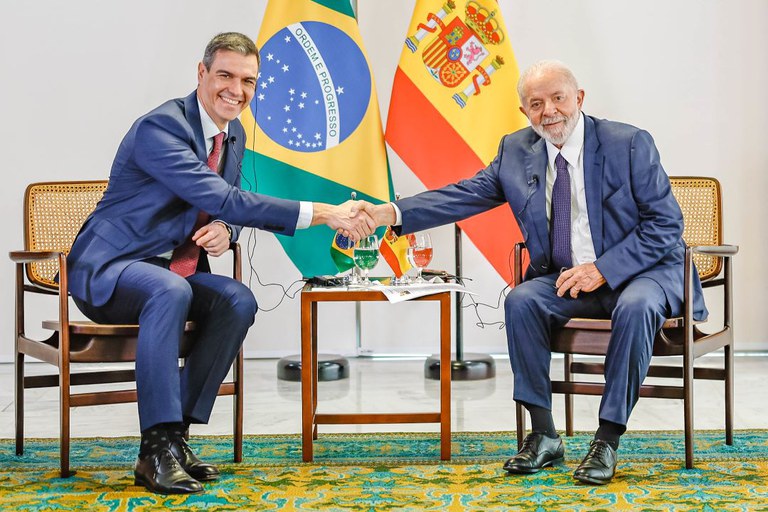Notícias
FOREIGN AFFAIRS
“We were able to prove the affinity between our governments,” said Brazil’s Lula about visit of the president of Spain

President of the Government of Spain, Pedro Sánchez, and President Lula during a bilateral meeting at Planalto Palace - Credit: Ricardo Stuckert/PR
Brazil’s President Luiz Inácio Lula da Silva received the president of the Government of Spain, Pedro Sánchez, at the Planalto Palace, in Brasília, during the latter’s official visit to Brazil on Wednesday, March 6. The two leaders discussed Spanish investments in Brazil; energy transition; and prospects for the agreement between Mercosur and the European Union, among other topics.
“It is a source of great joy to welcome the president of the Government of Spain, Pedro Sánchez, and to reciprocate the warm welcome he offered us on our visit to Madrid in April last year. Today, we were able to prove once again that there is a great affinity between our governments,” stated President Lula during the signing of acts between the two countries.
FIND OUT MORE:
High resolution images (Flickr)
Full text of President Lula's speech
INVESTMENTS — Lula presented Sánchez—and the businesspeople who came with the Spanish president—with investment opportunities in infrastructure and sustainability through Brazil’s new Growth Acceleration (Programa de Aceleração do Crescimento/PAC) and Neoindustrialization (Programa de Neoindustrialização) programs. “Our countries are taking great strides in the field of renewable energy—a field of cooperation that interests us greatly. Brazil's potential is unlimited for generating electricity from clean sources such as biofuels, wind, solar and green hydrogen,” highlighted the Brazilian leader.
Our countries are taking great strides in the field of renewable energy—a field of cooperation that interests us greatly. Brazil’s potential is unlimited for generating electricity from clean sources such as biofuels, wind, solar and green hydrogen”
Luiz Inácio Lula da Silva, President of Brazil
Spain is the second main foreign direct investor in Brazil (from the perspective of the final controller), with a stock of USD 48 billion in 2022. In terms of direct investment stock ("immediate investor"), Spain is the fourth largest, with USD 59 billion (average over the last 10 years).
The Spanish president highlighted the continued interest of Spanish investors in Brazil, and mentioned the special attention that is being given to the field of energy transition and adaptation to combat climate change. “Spanish companies recognize this transformative impulse that President Lula gives to the Brazilian economy and to regulatory stability, and also to the fiscal reform they carried out. It is an important element and will allow us to attract greater investment from foreigners into this country,” he stated.
COOPERATION – Representatives from both countries signed four memorandums of understanding for cooperation in different areas. In the field of telecommunications, the agreement was established between Brazil’s Ministry of Communications (Ministério das Comunicações) and Spain's Ministry of Economy, Commerce and Enterprise alongside companies Hispasat S.A. and Telebrás. Brazil’s Ministry of Science, Technology and Innovation (Ministério da Ciência, Tecnologia e Inovação) and the Spanish Ministry of Science, Innovation and Universities will work together on topics referring to their respective topics.
To promote the training and improvement of people within the scope of Brazil’s Virtual School of Government (Escola Virtual de Governo/EV.G), the National School of Public Administration (Escola Nacional de Administração Pública/ENAP) signed a memorandum of understanding with Spain’s National Institute of Public Administration (Instituto Nacional de Administración Pública/INAP). An agreement was also signed between Spain’s Carlos III Health Institute (Instituto de Salud Carlos III) and Brazil’s Oswaldo Cruz Foundation (Fundação Oswaldo Cruz/Fiocruz).
DEFENSE OF DEMOCRACY — Lula and Sánchez also spoke about the importance of protecting democracy and combating disinformation. “Spain and Brazil are two great democracies that face extremism, denial of politics and hate speech, fueled by fake news. Our experience in confronting the extreme right—which operates under international coordination—teaches us that it is necessary to unite all the democrats in the world,” pointed out the Brazilian president.
“We will institutionalize a permanent dialogue mechanism between the governments of Brazil and Spain, because we share views on very important issues—firstly the need to defend democracy from extremist attacks such as the events of January 8, 2023,” said Sánchez.
Lula also observed that Brazil and Spain have seen episodes of racism, racial discrimination and xenophobia also in the field of mass-audience sports. “Only an inclusive social project will allow us to build prosperous, free, democratic and sovereign societies,” said the president.
LABOR — Another topic that was discussed at the meeting between the two presidents was the promotion of labor rights in the face of new technologies. In this context, Lula cited the signing of the PL by app drivers this week. “Spain’s experience was an inspiration for the bill that regulates work via transport apps that will benefit 1.5 million workers in Brazil,” he said.
“We agree on the urgency of promoting a comprehensive debate around the governance of artificial intelligence in order to minimize risks and distribute benefits equally to all countries,” added Lula.
MERCOSUR AND THE EUROPEAN UNION — Negotiations for the trade agreement between Mercosur and the European Union were also discussed at the meeting. The Spanish president committed to working to make the agreement viable and stated that he hopes it will be concluded soon.
“We will work together to reach this agreement that, without a doubt, will promote a change in global geopolitics. This is because not only would the largest commercial exchange area in the world be created, but two regions would be united in their shared and very interesting visions to face the global challenges of democracy, respect for human rights, gender equality, climate change and inclusive development in our societies,” highlighted Sánchez.
“We have reached a situation in which—politically, economically and geographically—we need to make this agreement. We need to give a signal to the world that we want to move forward. That’s why I’m optimistic,” declared Lula.